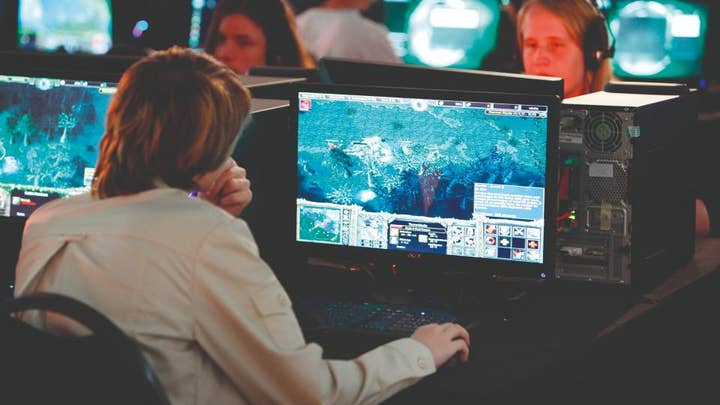"We need to be more positive about the games industry"
University of West London's Jay Shin discusses the barriers that the video games business needs to bring down to keep attracting future talent
The games industry is facing a talent crisis. As video games grow larger and more complex, as does the business around them, companies are struggling to recruit the people and skills needed to achieve their long-term goals.
There are short-term solutions, of course, such as acquiring other companies (if you have the capital to do so) or offering remote or hybrid working as a way to reach people who are unable or unwilling to relocate.
But the industry still needs to be conscious of the broader picture, and address the obstacles at the very beginning of the pipeline: inspiring young people to seek a career in video games.
Jay Shin is senior lecturer and course leader for games, design and animation at University of West London, as well as a co-founder of indie studio Arrogant Pixel, Women In Games ambassador, UKIE board member and part of this year's Ensemble exhibition, highlighting Black, Asian and underrepresented ethnicities in the UK games industry. And finding future talent for the industry is something she spends a lot of time thinking about.

"I think that there's a perception issue," she tells GamesIndustry.biz. "The kids are really excited about video games, but it's the parents that need a little bit of convincing that it's a worthwhile career. I think that they're under the impression that video games are unstable in some way, that this is a fad that might just go away at some point. We know that that's not true, but the impression that I'm getting from some of the more difficult conversations I've been having with parents is that they don't understand that it's an industry.
"A lot of parents don't have the inclination or interest in learning more about this art form. They understand film and music, but video games seem to be a little bit out of reach. So, for me, I think it's just a branding issue. The kids themselves are very, very positive about it, and want to come into the industry. But some of them really rely on parent approval, and that's the main hurdle for getting more people into the games industry."
She adds that there's a lack of understanding about what working in the industry involves. It's not about playing games, as some parents still believe, but a range of disciplines -- especially when it comes to development. And skills like coding and 3D modelling can be just as useful in other industries, which means students aren't limiting their career path. Yet, Shin says, this doesn't seem to come across, and that if the industry were to highlight both the range of roles and the positive impact of video games, it might convince more parents to see it as a valid career path.
"We need to be more positive about the games industry," she says. "I think, as an industry, we're actually very negative about things that go on. For example, we are bigger than films and music. I think that should be highlighted more. Secondly, I think that we should stop talking to people that are already converted, and we need to do more outreach. Maybe a documentary on Netflix or something, informing people about game development. We've got loads of behind the scenes of musicians and famous artists when they go on tour. Why not have a behind the scenes of God of War, or Call of Duty?"
"Even if you live in the same postcode, there are some students with £8,000 PCs... [and others] that barely had access to a working tablet"
Another factor, Shin adds, is a lack of recognisable celebrity-like figures to help draw attention to the work that goes into making video games.
"We don't have that personality," Shin acknowledges. "If you think about music and film, you have actors, you have a face, whereas in the games industry, we don't. The product is what goes out to the public. We need a personality in this country. Someone that we can be like, 'This is our Shigeru Miyamoto' to inspire the younger generation."
The industry is not without its auteurs and familiar faces: Hideo Kojima, Tim Schafer, Ron Gilbert, John Romero - to name a few. And the UK had its own star developers decades pasts with early pioneers such as Peter Molyneux, David Braben, the Darling brothers, the Oliver twins and so on.
"But they don't look like us at the moment," Shin argues. "That's the first generation. Who do we have for the second or third generation? Maybe the people in [Ensemble]? We need more positive role models.
"I think a lot of students are afraid of getting into the industry because of all of the harassment allegations that were going around about studios. But I would say that harassment happens everywhere, and it's not exclusive. I just want to see more positive stories about the video games industry, rather than things that might incite moral panic, or things like that."
It's been hard to avoid stories of harassment and toxicity in recent years, with allegations and lawsuits directed towards a range of companies, from AAA giants like Activision Blizzard and Ubisoft to indie darlings such as Steve Gaynor, Robin Hunicke and Ken Wong.
Despite how widespread these stories have become, Shin is confident that it's not representative of the majority of games industry workplaces. And, further to her point about more positivity, she's keen to discuss other benefits of a career in games.
"Think about it this way: it's very rare in the creative industries to have a stable career. In games development, that's not the case. You can have a very stable job in a studio, or even in a tertiary industry if you're working for a publisher or anything like that. It is more possible than ever to have a stable career in games, and also above minimum wage as well, because the salaries for programmers, even senior art directors and things like that, are fairly high for creative industries.
"Even in comparison to music and films, there are numerous roles and companies crying out to hire people, but they are not materialising. The problem is that we're not getting enough volume into our courses, into the pipeline, so that we can't produce this number of senior art directors and UX people and programmers for them to hire. So, the same people just play musical chairs in the companies. There is a skills gap."
Plugging that gap will require "major societal changes," however. And some of that comes down to enabling equal opportunities for people to even engage with games, let alone learn how to make them. Prior to her time as a university lecturer, Shin taught at a college where she saw how diverse a group of students could be, with different backgrounds and experiences.
"The kids are really excited about video games, but it's the parents that need a little bit of convincing that it's a worthwhile career"
"Even if you live in the same postcode, there are some students, for example, that had access to £8,000 PCs at home. Their parents would be like, 'Yes, video games are for you. We're going to invest a load of money into getting you set up.' And then, on the complete flip side, we had students that barely had access to a working tablet. There were four kids in one home, and they didn't even have proper internet -- they were all tethering off mum's mobile data to dial into online classes. So access to equipment is not equal."
Access to equipment is vital, given the complexity of development for even the most basic games. As Shin puts it: "We are not running Microsoft Word. We're running really heavy 3D programs -- you can't use a bottom range laptop to run that."
She continues: "At a very basic level, we're not providing the equipment that students need to even spark an interest in technology. It's not just video games, it's how do we inspire students to pick up programming? How do we inspire students to pick up advanced graphics rendering or CGI? We can't, unless they have access to that gear, which is why we need to fund our colleges."
Access to high-speed internet is also unequal, Shin adds, noting that the students who were able to engage in her online classes during the pandemic lockdowns were the ones with good support at home. These students lived in homes where multiple devices could handle streaming, taking into account siblings and possibly remote working parents who all relied on the internet.
"We need some really basic infrastructure to be put in so that this is even possible. There are a lot of things that could be done. I don't know if they will be, but it's something that I'm hopeful for if this government sees that it's worthwhile."

